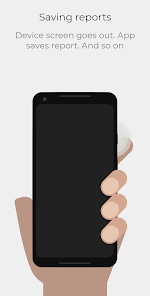touch my mobile without permission Is your mobile device truly yours? In a world where privacy is becoming increasingly scarce, it’s essential to understand who can touch your mobile without permission. Unauthorized access to your phone can lead to serious consequences, from personal data breaches to potential legal issues. Let’s delve into the importance of mobile privacy and discover how you can safeguard your device from prying eyes and unwarranted intrusion. So, buckle up as we explore the realm of mobile security together!

The Importance of Mobile Privacy
In today’s digital age, our mobile devices hold a treasure trove of personal information. From sensitive emails and financial details to intimate conversations and browsing history, our phones are a reflection of our lives. Protecting this data is crucial in maintaining our privacy and security.
Mobile privacy goes beyond just locking your screen with a passcode. It involves safeguarding against unauthorized access by individuals or malicious entities seeking to exploit your personal information for their gain. With the rise of cyber threats and hacking incidents, ensuring the confidentiality of your data has never been more important.
By understanding the significance of mobile privacy, you empower yourself to take proactive measures to defend against potential breaches. Stay vigilant and informed about the latest security practices to keep your device secure from prying eyes and unauthorized touch.
Types of Unauthorized Access to Mobile Devices
When it comes to unauthorized access to mobile devices, there are various methods that individuals may use to infringe upon your privacy. One common type of unauthorized access is physical theft or loss of your device. This can lead to someone gaining direct access to all the information stored on your phone.
Another form of unauthorized access is through malware and phishing attacks. Cybercriminals can send malicious links or emails in an attempt to trick you into revealing sensitive information or downloading harmful software onto your device.
Additionally, unauthorized access can occur through unsecured Wi-Fi networks. Hackers can intercept data being transmitted over these networks, potentially accessing personal details stored on your device.
It’s important to be aware of these different types of threats and take necessary precautions to protect your mobile device from falling into the wrong hands.
Risks and Consequences of Unauthorized Mobile Access
When someone gains unauthorized access to your mobile device, the risks and consequences can be significant. Personal information such as emails, messages, photos, and financial data may be compromised. This breach of privacy can lead to identity theft or fraud.
Moreover, unauthorized access can result in the misuse of your social media accounts or even impersonation online. Your reputation may suffer as sensitive content could be shared without your consent. In some cases, hackers may install malware or spyware on your device to track your activities without you knowing.
The emotional toll of having one’s privacy invaded cannot be underestimated. It can leave individuals feeling vulnerable and violated. Additionally, if confidential work-related information is accessed without permission, it could have serious repercussions for both employees and employers alike.
It is crucial to take proactive steps to safeguard your mobile device from unauthorized access by implementing security measures such as strong passwords, biometric authentication methods like fingerprint or facial recognition technology, and being cautious about sharing sensitive information online.
Ways to Protect Your Mobile Device from Unauthorized Access
One of the most important ways to protect your mobile device from unauthorized access is by setting a strong password or PIN. Make sure it’s something unique and not easily guessable.
Another effective method is enabling biometric authentication such as fingerprint or facial recognition. This adds an extra layer of security to your device.
Regularly updating your operating system and apps can also help prevent unauthorized access. These updates often include security patches that fix vulnerabilities hackers could exploit.
Avoid connecting to unknown Wi-Fi networks, as they can be potential hotspots for hackers looking to intercept data on your device. Stick to trusted networks whenever possible.
Consider using encryption tools to secure sensitive data stored on your mobile device. This way, even if someone gains physical access to your phone, they won’t be able to easily retrieve the information inside.
Stay vigilant and aware of any suspicious activity on your device. If you notice anything out of the ordinary, take action immediately by changing passwords and running scans for malware.
Protecting your mobile device from unauthorized access requires proactive measures and constant vigilance in today’s digital age where cybersecurity threats are ever-evolving.
Legal Implications and Rights
When it comes to the legal implications of unauthorized access to mobile devices, it’s essential to understand your rights as a user. In many jurisdictions, accessing someone else’s device without permission can be considered a violation of privacy laws.
Unauthorized access to a mobile device can lead to serious consequences such as data theft, identity fraud, and invasion of privacy. As technology advances, courts are increasingly recognizing the importance of protecting individuals’ digital information.
In some cases, unauthorized access may even constitute a criminal offense punishable by law. It’s crucial to be aware of the potential legal ramifications for both perpetrators and victims involved in such incidents.
Users have the right to protect their personal information and data from unauthorized access. By taking proactive measures like setting up passwords, using biometric authentication, and enabling remote wiping capabilities on your device, you can better safeguard your privacy.
The Role of Permission in Mobile Usage
In the realm of mobile usage, permission plays a crucial role in maintaining privacy and security. It is essential to set boundaries and define who can access your device. By granting permission consciously, you retain control over your personal information and data.
Permission extends beyond physical touch; it includes allowing apps to access certain features or data on your phone. Being mindful of the permissions you grant can prevent unauthorized parties from obtaining sensitive information without your knowledge.
When you give someone access to your mobile device, whether physically or digitally, you are entrusting them with a part of your private world. Establishing clear boundaries and communicating expectations regarding permission ensures that this trust is respected.
Understanding the significance of permission in mobile usage empowers individuals to safeguard their privacy effectively. By being vigilant and intentional about who can touch our mobile devices without permission, we take proactive steps towards protecting our personal data from potential threats.
Conclusion
In a world where our mobile devices hold our most personal information, it is crucial to prioritize privacy and security. Unauthorized access to your phone can lead to severe consequences, including identity theft, financial loss, and invasion of privacy.
To prevent unauthorized access to your mobile device, implement strong security measures such as biometric authentication, PIN codes, and encryption. Be cautious about who you allow to handle your phone and always be mindful of the permissions you grant to apps.
Remember that legal implications exist for those who infringe upon your right to privacy by accessing your mobile device without permission. It is essential to understand your rights and take appropriate action if necessary.
By being proactive in safeguarding your mobile device and staying informed about privacy laws and regulations, you can protect yourself from touch my mobile without permission unauthorized access and maintain control over your personal data. Stay vigilant, stay informed, and keep your mobile device secure at all times.



